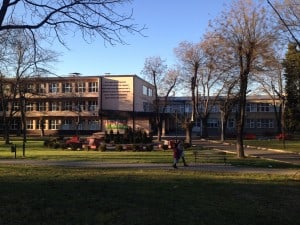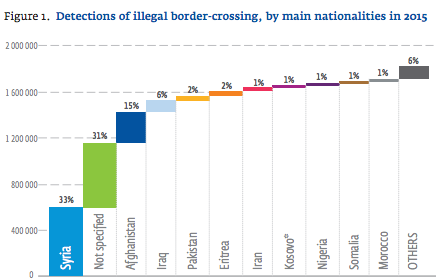Overtly false news published and packaged for profit. Government propaganda and information warfare. Highly questionable reporting that is accepted as fact and spread by mass media institutions. What exactly is fake news and how is it made?
In a FreeManPost podcast, FMP publisher Josh Friedman and editor Brent Sanders look to the small Balkan state of Macedonia to examine the making of Fake News. They then turn to the surrounding region to deconstruct claims pushed by the United Nations and major news and internet companies on the percentage of migrants and refugees arriving in Europe who are actually from Syria.

First, Friedman and Sanders zero in on Veles, Macedonia, which major media identified last year as a hub of fake news. In Veles, Macedonian teens were publishing false news stories packaged on professional-looking news sites and spread across cyberspace through highly-effective social media campaigns. Friedman, who visited the high school that the fake news publishers attend, discusses his conversation with one of the more successful members of the industry.
Next in the discussion on fake news is the propaganda battle, or information warfare, that has taken place recently in Macedonia. With the West supporting one political faction in Macedonia and Russia backing the opposing side, international news coverage of the country’s recent political crisis became remarkably polarized.
Russian state media ran English-language headlines like “NATO Willing to See ‘Blood in Macedonia’ for Greater Albanian Project.” The Kremlin’s international media arm, Sputnik, accused the west of conspiring with ethnic Albanians to significantly expand the territory of Albania by grabbing land from neighboring states, including Macedonia. Meanwhile, major western media and billionaire George Soros sided with Macedonia’s then-opposition, promoting mass protests and the resignation of the country’s nationalist government amid corruption and abuse of power allegations. What resulted was essentially a geopolitical tug of war over a landlocked country with a population of only about 2 million people. The West won the latest round of the tug of war, with Macedonia’s Social Democrats and ethnic Albanian parties forming a coalition government last week.
The fake news discussion wraps up with questions being raised over the integrity of reporting on Europe’s refugee crisis. In 2015, the peak of the crisis, more than 1 million migrants entered Europe, primarily crossing the Aegean Sea and then traveling up through the Balkans prior to reaching their destinations.
For major western media, the United Nations High Commissioner for Refugees (UNHCR) served as the most trusted source of information. But when comparing UNHCR data to statistics compiled by Frontex, the EU border guard agency, discrepancies appear. Likewise, eyewitness accounts of the Balkan route raise questions as to whether UNHCR was skewing data, particularly on the percentage of asylum seekers who were coming from Syria.

When one googles “where the refugees are coming from,” an excerpt from a Wikipedia entry pops up stating, “In 2015, over 80 percent of the refugees whom arrived in Europe by sea, came from Syria, Iraq and Afghanistan.” The word “Syria” is in bold.
Upon further investigation, it can be seen that the Wikipedia entry cites a BBC article as its source. The BBC article cites a UNHCR press release, which states, in 2015, “one-in-every two of those crossing the Mediterranean” were Syrians fleeing war. The news release then states Afghans accounted for 20 percent of the asylum seekers crossing the Mediterranean and Iraqis made up 7 percent.
Frontex’s figures, too, indicated Syria, Afghanistan and Iraq were the leading countries of origin for asylum seekers arriving in Europe in 2015. However, Frontex’s annual report told a different story.

“The breakdown by nationality, however, should be considered with caution as thorough interviews of a proportion of migrants during the screening procedure indicated a high degree of falsely claimed nationalities,” the Frontex report states. “Indeed, many migrants claimed to be from Syria or Afghanistan, to avoid being returned to Turkey or their country of origin, and to speed up their journey within the EU.”
While acknowledging its numbers may be skewed, Frontex states 33 percent of individuals who illegally crossed into the EU in 2015 came from Syria, followed by 15 percent from Afghanistan and 6 percent from Iraq. The Frontex report lists 31 percent of the people entering the EU illegally as being from unspecified countries.
During the podcast, Friedman says Frontex’s assertions appear to be more accurate and forthcoming than UNHCR’s reporting, when taking into account what he witnessed in the Balkans in 2015. Friedman traveled around the Balkans in the fall of 2015, photographing and videotaping refugee flows and conducting interviews with asylum seekers. From what he witnessed and recorded, Syrians did not appear to make up 50 percent of the asylum seekers arriving in Europe. Syrians likely comprised a plurality of asylum seekers that year, but there were sizeable numbers of migrants coming from all over the world, including much of Africa and countries as far away as Bangladesh. Additionally, some migrants admitted they were falsifying their nationalities on documents, and others were witnessed being rejected by border guards for doing so.
As mentioned in the podcast, these points do not delegitimize the Syrian refugee crisis, which was and is a matter of life and death for thousands, if not millions, of people. However, the examination of refugee data does raise questions over the integrity of information about world events that major institutions present as established fact.
“So it just all gets recycled,” Sanders said during the podcast. “You have one source, which is unverified, then BBC links to that source, cites that source, and then Wikipedia takes from BBC.”
Ultimately, Google grabs the data from the BBC and Internet users consume it. Fake news? You decide.
